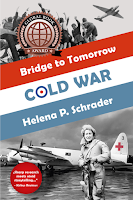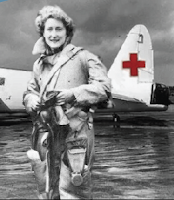Characters of "Cold Victory" : EMILY PRIESTMAN
Although Emily is the wife of Wing Commander Priestman, she is much more than the woman at his side. She is also a veteran pilot, having been a ferry pilot with the ATA during the war, and the business partner of David Goldman, the owner-manager of the aviation company "Emergency Air Services." But it isn't Emily's positions that matter, but rather the fact that she has a gift for holding things together and helping people to get along.
In this excerpt, Emily is at a low point, realizing that her husband's posting puts an end to her work with the air ambulance as well.
Emily had a quickwash and dressed in her Emergency Air Services (EAS) uniform of black trousers,double-breasted, black blazer and red silk ascot. Although she liked thisattire and was proud of the golden cloth wings above the left breast pocket andthe three golden stripes on her sleeve, she wondered how much longer she wouldwear it. She could not let Robin return to the UK alone, so his dismissal asstation commander meant that her days flying the air ambulance were also comingto an end.
Despite her bestefforts to appear calm and resigned about the situation, she was inwardly seething.She found it unfathomable that Robin’s dedication and effectiveness at Gatowhad gone unnoticed. She also considered it unforgivable that he was beingpunished for doing the right thing: saving orphans, malnourished children andpeople with chronic diseases from unnecessary suffering. The fact that he hadbeen requested to organize the evacuation by the senior British officer inBerlin made things even worse. None of it made sense!
Part of herwanted to protest publicly. She’d been briefly tempted to go to the press. Whatwould the public think if they learned that the RAF leadership preferred blindobedience to responding to the needs of innocent children? There was a womanreporter with the Times who loved breaking stories of bureaucraticobtuseness and incompetence. Yet Emily held herself in check. Robin didn’t wantany publicity. He identified too strongly with the RAF to want any criticism ofit to be made public.
Coming down thestairs to the ground floor, Emily told herself that rather than pursuing mentalfantasies of revenge or protest, she ought to start packing up their personalthings in preparation for returning to the UK. Robin’s replacement might comewith a wife and several children. He would expect to move into the officialresidence immediately and, according to Robin, that might be as early as nextMonday afternoon.
Emily crossed theicy dining room to join their house guests at the breakfast table. Kit Moranwas another pilot with EAS, while his wife Georgina worked as a teacher at theBritish school. “Good morning!” Emily greeted the others as she closedthe glass doors behind her to keep as much warmth inside as possible.
Her guestsresponded with cheerful greetings and then Kit announced, “Georgina and I were justwondering whether the Station might host a Christmas party for some Berlinchildren. Although the sickest children are being flown out, hundreds ofthousands remain, and what sort of Christmas are they going to have? Therearen’t any Christmas trees or decorations, let alone presents and feasts.”
“What I wasthinking,” Georgina took up the topic enthusiastically, “was to approach someof the nearby German schools. If we work with the teachers and focus on theyounger children, we might be able to organise a party for three or fourhundred children. We could ask the staff at Gatow to donate presents. I’m surewe’d collect plenty!”
Listening to her,Emily was reminded that Georgina was a vicar’s daughter. She was used to bothorganizing Christmas events —and asking for charity.
Kit, clearly inthe spirit of things, pointed out, “I think that a hot meal with turkey, realpotatoes and hot chocolate might be more appreciated than gifts. I wasthinking, that while we can’t take the Halifax off the Airlift, you might beable to sneak in a flight to the UK and back with Moby Dick” (that was whatthey called the air ambulance). “The Wellington,” Kit reminded them, “had abomb capacity of 4,500 lbs, which means that Moby Dick could carry more thanenough turkeys, potatoes and Christmas pudding for several hundred kids.”
“We could evenbring in oranges!” Georgina enthused.
Her husband,however, had detected Emily’s reticence and asked, “Is something wrong?”
“It sounds like awonderful idea,” Emily admitted, “and weather permitting, I think David wouldbe willing to authorise the use of Moby Dick to bring in food. However,” shedrew a deep breath and then added, “I’m afraid, the station commander will haveto approve the use of RAF facilities and access to the station for so manychildren, their teachers or parents.”
“But why wouldn’tRobin….” Georgina started confidently only for her words to fade away as herhusband flashed her a warning with his eyes.
Emily drew a deepbreath and announced, “Robin is no longer station commander, and we have noidea who will replace him, much less if he might be inclined to approve aChristmas party for German children or not.”
“But when….why… Idon’t understand,” Georgina admitted, looking from her husband to her hostessand back.
“Theevacuations,” her husband drew the right conclusion. “I heard rumours thatGroup Captain Bagshot had not approved them and was furious.”
Emily nodded.“Robin won’t make a public announcement about his departure until he knows moredetails, but I should have said something privately. This is RAF housing, youunderstand, and when we turn it over to Robin’s successor, you will have tomove out. I’m very sorry.”
“Don’t worry,”Kit assured her. “We can take rooms in the Malcolm Club with the others.” Theother four members of Kit’s crew along with the second pilot and flightengineer of the air ambulance rented rooms at the Malcolm Club at RAF Gatow.
Before Emilycould say any more, a voice rang out from behind them. “Hello? Anybody home?”
“That’s Kiwi!”Emily exclaimed in astonishment, leaping to her feet to open the glass doors.She called through the dining room towards the front entry, “Kiwi! We’re in thebreakfast room!”
A moment laterthe tall, fair-haired New Zealander breezed in. He received welcoming kisses onboth cheeks from Emily and handshakes from the Morans. Then he tossed aside hiscap and laid his damp greatcoat over the back of an unused chair as he sat downat the table. The sound of his arrival brought one of the housemaids out of thekitchen. She asked politely if she should bring another place setting and morecoffee, which Emily welcomed.
“Did you just flyin?” Emily asked eagerly.
“Hitch-hiked withRafair.”
“Which meansthey’re flying?”
“Some flights aregetting through — not as many as are needed. They’re prioritizing the largeraircraft. Albatross” (the nickname for Moran’s Halifax) “ought to be able toget cargoes, so I came to find out what’s going on. Are we in business oraren’t we?”
Silence answeredhim. Kit and Georgina looked at Emily.
Drawing a deepbreath, she explained, “Robin’s been relieved of his command—”
“What a flamingcock-up! Excuse me, ladies. That bastard Bagshot!” Kiwi grasped the situationat once. “I should have known!”
“That doesn’t initself close down EAS,” Emily hastened to point out. “I will, of course, resignand return to the UK with Robin, but you can take command of Moby Dick, Kiwi.”
“That’s not theissue,” Kiwi replied. “The point is that David’s so cracked up over Charlottedumping him that he’s stopping running the company. It’s bad enough thatCharlotte is no longer handling the customers, but for most of November, Davidhandled them himself and we managed to limp along. Since last Saturday, he’sstopped doing even that. I’ve called the office a dozen times, and all I get isthe frightened secretary who doesn’t have a clue what’s going on. DoesDavid intend to fold or what?”
“I can’t answerthat, Kiwi,” Emily admitted. “I haven’t seen David this week either. Robin’sdismissal took me by surprise and the weather was an excuse not to probe. Itdidn’t help that Robin thinks the Airlift is on the brink of collapse. If themajority of the Berliners boycott the election or vote outright for the SED onSunday, then HM government will probably withdraw the British garrison.”
Kiwi counteredwith, “Look, we call ourselves ‘Emergency Air Services’ and that means we flyprecisely where and when things are risky and unstable. We’ve got two fullyserviceable aircraft sitting in a hangar at Gatow, not to mention idle groundand aircrew. We ought to be flying until they shoot us out of the sky.”
“Agreed,” Kitseconded him. “Albi’s had a cargo stowed for eight hours. If Gatow’s open, I’llmake a run to Hanover with it.” He stood as he spoke, bending to give Georginaa quick kiss.
“Emily?” Kiwiasked.
“There’s noreason why the Halifax shouldn’t be flying whenever visibility allows.Regarding the ambulance, however, we can’t fly until we have a flight planbased on what patients need to go where. Either David or Charlotte is going tohave to start working again.” She hesitated, but it had to be said. “And whileI agree that we ought to keep flying, David writes the cheques. We haveto find out what he wants.”
Her remark wasmet with silence. It wasn’t only the people in this room who depended on EASfor their livelihood. The company employed German office staff, eight otheraircrew and seven ground crew, including a man paralyzed from the waist down.Closing EAS would be a disaster for all of them. Emily knew that, but David hadfounded the company, and he was its majority shareholder and chief executiveofficer.
“I’d better goand talk to him,” Emily concluded, knowing that this was much more importantthan packing up her things.
“Thank you,” Kiwireplied, adding “And try to talk some sense into him, would you?”
“I’ll do mybest.”
Find out more about the Bridge to Tomorrow series, the awards it has won, and read reviews at: https://helenapschrader.net/bridge-to-tomorrow/







